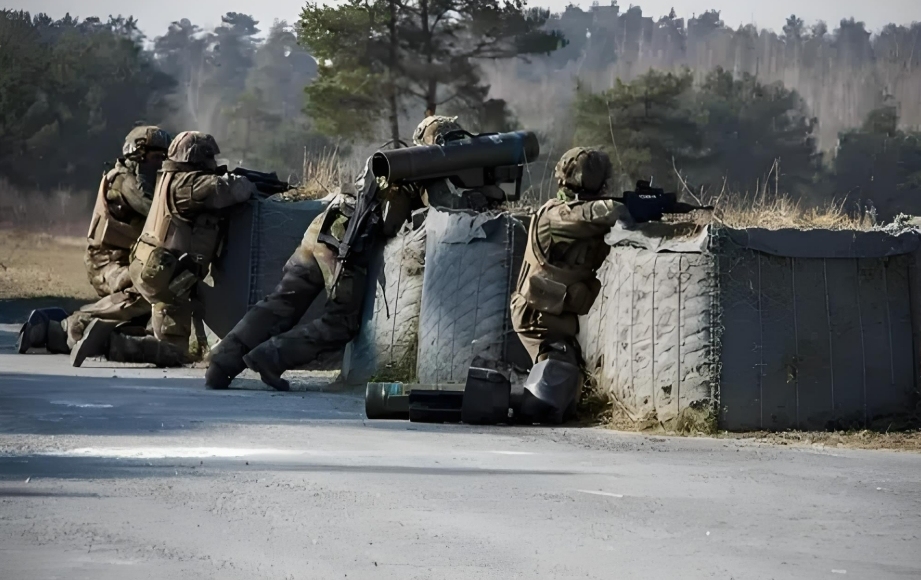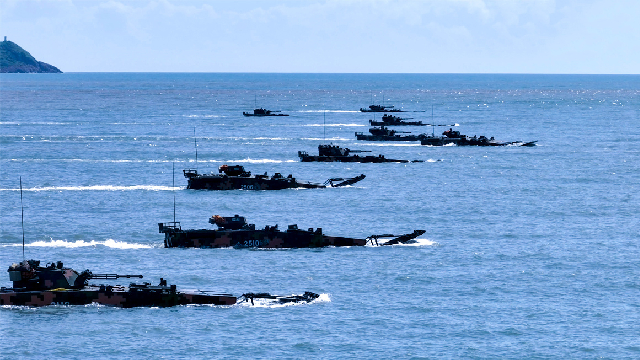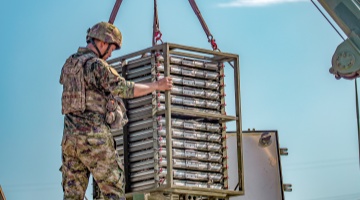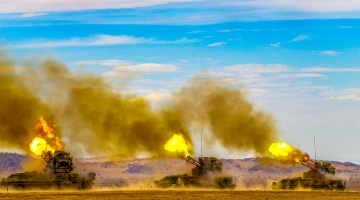By Ling Yunzhi
凌云志

The photo shows a joint exercise of Franco-German Brigade of the Eurocorps.
欧洲军团法德旅举行联合演习。
It has long been a persistent goal for the EU to pursue autonomous defense. Despite its aspirations to develop an independent military force and achieve defense integration, tangible progress has remained elusive.
寻求自主防务是欧盟长期以来一直孜孜不倦追求的目标。虽然发展独立的军事力量、走防务一体化道路一直是欧盟的梦想,但始终没有取得实质性进展。
With the Trump administration taking office, US-Russia relations have shown signs of warming, leading to rising anxiety across Europe. Within weeks of his inauguration, Donald Trump repeatedly voiced opinions on the Russia-Ukraine conflict that were different from previous US stances. On February 12, Donald Trump said from the Oval Office that he does not "think it's practical" to have Ukraine join NATO. In addition, US Defense Secretary Pete Hegseth remarked that European security is no longer a priority for the US. He emphasized that NATO's European members should shoulder greater financial responsibilities to ensure their own security, rather than relying indefinitely on America's protection.
随着特朗普政府上台,美俄关系趋向回暖,欧洲的焦虑感不断上升。特朗普在上任后不到一个月,就多次公开表达对俄乌冲突的不同看法。2月12日,特朗普表示乌克兰加入北约的计划是“不切实际的”。此外,美国防部长赫格塞思表示,欧洲安全已经不是美国的优先事项,北约的欧洲成员国应承担更多财政责任,以确保自身安全,不能一直指望美国的“保护伞”。
Faced with such a situation, Europe has become acutely aware of its critical weakness in defense capabilities and has recognized the severe consequences of lacking strategic autonomy while closely following the US lead. As a result, the urgency and demand for strategic independence have surged, further accelerating the process of establishing a European Army.
面对这样的局面,欧洲已经意识到自身防务力量不足的致命弱点,更清楚看到缺乏战略自主、对美国亦步亦趋的严重后果,对战略自主的需求和关切程度迅速提升,这些也将进一步推动欧洲组建“欧洲军”的进程。
However, the future of a European Army remains highly uncertain.
然而,“欧洲军”的前景仍具有较大不确定性。
First, there is a lack of effective coordination mechanisms among European nations, making it difficult to achieve tangible results. Currently, divisions persist not only among the 27 EU member states but also between Eastern and Western Europe, and even between France and Germany, the two leading European powers, on the issue of defense integration. For example, at a recent emergency meeting in Paris, European nations were deeply divided over the issue of deploying peacekeeping troops to Ukraine. Apart from the UK, which expressed willingness to send troops, countries like France and Germany showed no intention of deploying forces to Ukraine at this stage. Without the support of France and Germany, it would be difficult to implement the formation of a joint European force.
首先,欧洲国家内部之间缺乏有效协调机制,难以达成实质性成果。目前,欧盟27个成员国之间、东西欧国家之间甚至法德两个欧洲大国之间在防务一体化问题上均存在分歧。例如,在此次巴黎紧急会议上,欧洲在向乌克兰派遣维和部队问题上出现较大分歧。除英国表示愿意派军以外,法德等国均无意在现阶段向乌派遣部队。如果没有法国和德国的支持,欧洲组建联合部队将难以付诸实施。
Secondly, the US has a highly complex attitude toward the EU's efforts to strengthen its own defense cooperation. On one hand, Washington expects Europe to increase military spending, take on more responsibility for its own defense within the NATO framework, and ease the burden on the US as much as possible. On the other hand, the US remains deeply skeptical of Europe's current push for defense autonomy, fearing that an independent European army could weaken American influence on the continent, reshape the global strategic landscape, and potentially hinder Washington's broader geopolitical objectives.
其次,美国对于欧盟加强自身防务合作的心态非常复杂。一方面。美国希望欧洲增加军费投入,在北约框架下更多地承担自身防务,尽最大可能地分担美国的负担。但另一方面,美国又对欧洲当前的防务自主计划疑虑重重,担忧欧盟通过积极“建军”、实现防务独立后,会削弱美在欧洲的影响力,甚至会改变世界的战略格局分布,影响其全球战略的实施。
Finally, NATO remains a major obstacle that Europe cannot avoid in its pursuit of defense independence. NATO believes that Europe's push for military development outside of the alliance would lead to resource competition, create divisions, and challenge its leadership as the primary defense organization in Europe. Moreover, many smaller European countries, particularly those in the Baltic region, as well as Eastern European nations like Poland and Romania, lack confidence in Europe's independent defense capabilities. They continue to rely on the US-led NATO for security, showing little interest in the formation of a European Army. It is foreseeable that if these conflicts remain unresolved, the EU's plan to establish a European Army will face significant challenges and the process of deepening defense integration will remain a long and difficult road.
最后,北约是欧洲谋求防务独立始终绕不开的一道坎。北约始终认为,欧洲在北约框架之外推动“建军”,将会引起资源竞争、制造对立,并挑战北约作为欧洲主要防御机构的领导地位。此外,很多欧洲中小国家,特别是波罗的海沿岸国家和波兰、罗马尼亚等东欧国家对欧洲独立防务信心不足,把安全保护伞寄希望于以美国为主的北约,对组建“欧洲军”的兴趣不大。可以预见的是,如果这些矛盾得不到解决,未来欧盟组建“欧洲军”计划还将面临重大挑战,深化防务一体化的进程也将任重而道远。
Editor's Note: Originally published on thepaper.cn, this article is translated from Chinese into English and edited by the China Military Online. The information and opinions in this article do not necessarily reflect the views of eng.chinamil.com.cn.













